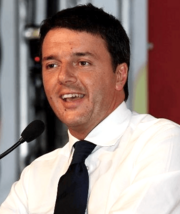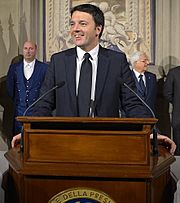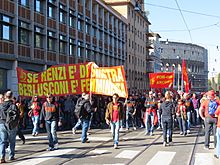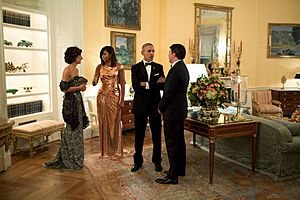Matteo Renzi facts for kids
Quick facts for kids
Matteo Renzi
|
|
|---|---|
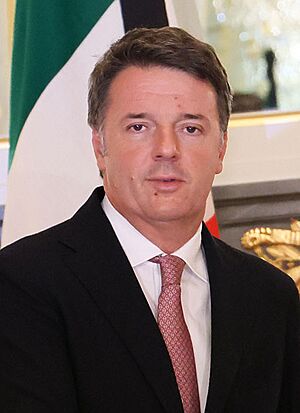
Renzi in 2022
|
|
| Prime Minister of Italy | |
| In office 22 February 2014 – 12 December 2016 |
|
| President | Giorgio Napolitano Sergio Mattarella |
| Preceded by | Enrico Letta |
| Succeeded by | Paolo Gentiloni |
| President of Italia Viva | |
| Assumed office 23 December 2022 |
|
| Preceded by | Position established |
| Secretary of the Democratic Party | |
| In office 7 May 2017 – 12 March 2018 |
|
| Deputy | Maurizio Martina |
| Preceded by | Matteo Orfini |
| Succeeded by | Maurizio Martina |
| In office 15 December 2013 – 19 February 2017 |
|
| Deputy | Lorenzo Guerini Debora Serracchiani |
| Preceded by | Guglielmo Epifani |
| Succeeded by | Matteo Orfini |
| Member of the Senate of the Republic | |
| Assumed office 23 March 2018 |
|
| Constituency | Florence (2018–22) Campania (2022–) |
| Mayor of Florence | |
| In office 22 June 2009 – 24 March 2014 |
|
| Preceded by | Leonardo Domenici |
| Succeeded by | Dario Nardella |
| President of the Province of Florence | |
| In office 14 June 2004 – 22 June 2009 |
|
| Preceded by | Michele Gesualdi |
| Succeeded by | Andrea Barducci |
| Personal details | |
| Born | 11 January 1975 Florence, Tuscany, Italy |
| Political party | PPI (1996–2002) DL (2002–2007) PD (2007–2019) IV (since 2019) |
| Spouse |
Agnese Landini
(m. 1999) |
| Children | 3 |
| Alma mater | University of Florence |
| Signature |  |
Matteo Renzi (born 11 January 1975) is an Italian politician. He served as the Prime Minister of Italy from 2014 to 2016. At 39 years old, he was the youngest person to ever hold the job. He has been a member of the Italian Senate since 2018.
Before becoming prime minister, Renzi was the president of the Province of Florence and later the Mayor of Florence. In 2013, he became the leader of the Democratic Party (PD).
As prime minister, Renzi's government made many changes. These included new labor laws to help the economy, updates to the government, and making civil trials simpler. His government also introduced civil unions for same-sex couples.
In 2016, he asked Italians to vote on a major change to the constitution. When the change was rejected in a referendum, he resigned as prime minister. In 2019, he left the Democratic Party to start his own party, Italia Viva.
Contents
Early life and career
Matteo Renzi was born in Florence, Italy. His father, Tiziano Renzi, was a local politician. Renzi grew up in a Catholic family in the nearby town of Rignano sull'Arno. In high school, he was a student representative and was involved in scouting.
In 1999, Renzi earned a law degree from the University of Florence. He worked for his family's marketing company. In 1994, he was a contestant on the TV game show La Ruota Della Fortuna (the Italian version of Wheel of Fortune), where he won a large sum of money.
Renzi became interested in politics in high school. In 1996, he joined the Italian People's Party. He later joined The Daisy party. In 1999, he married Agnese Landini, and they have three children.
Political beginnings
In 2004, Renzi was elected president of the Province of Florence. He was the youngest person to ever hold such a position in Italy. As president, he lowered taxes and reduced the number of government employees.
Mayor of Florence
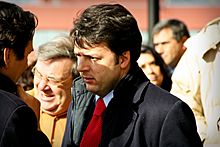
In 2009, Renzi was elected Mayor of Florence. As mayor, he cut the number of city council members in half. He also set up free WiFi spots around the city and spent more money on schools and social programs.
His popularity grew across Italy. He became known as il rottamatore ("The Scrapper") because he wanted to get rid of old-style politics. He believed that older politicians should retire to make way for new ideas.
In 2012, he tried to become the leader of the center-left coalition for the national election but lost to Pier Luigi Bersani. Renzi supported Bersani in the election campaign.
Leader of the Democratic Party
After the Democratic Party (PD) did not do well in the 2013 election, its leader, Pier Luigi Bersani, resigned. Renzi decided to run for the position of party secretary. Many people saw him as a fresh face who could bring change.
In December 2013, Renzi won the leadership election with 68% of the vote. He became the new leader of the PD. Soon after, there were tensions between Renzi and Prime Minister Enrico Letta, who was also from the PD. Renzi felt that as the party leader, he should be the one to lead the country.
In February 2014, Renzi asked Letta to step down so a new government could be formed. The party leadership supported Renzi's idea. Letta resigned, and the president asked Renzi to form a new government.
Prime Minister of Italy (2014–2016)
On 22 February 2014, Matteo Renzi was sworn in as Prime Minister. At 39, he was the youngest prime minister in Italian history. His government, or Cabinet, was also the youngest ever, with an average age of 47. It was the first Italian Cabinet to have an equal number of male and female ministers.
Renzi's government quickly began working on major reforms. He wanted to change Italy's economy, government, and laws.
Major reforms
Jobs and the economy
One of Renzi's first goals was to reform the job market. He introduced the "Jobs Act," a set of new laws to make it easier for companies to hire people. The goal was to help Italy's economy grow. The act was controversial and led to large protests from trade unions, who felt it weakened workers' rights.
His government also gave a small tax cut, known as the "Renzi bonus," to people with lower incomes. He hoped this would encourage people to spend more money. To raise money, the government sold hundreds of luxury cars used by state officials on eBay.
Government and voting changes
Renzi wanted to change how Italy's government worked. For a long time, Italy had two houses of Parliament with equal power: the Chamber of Deputies and the Senate. This system, called "perfect bicameralism," often made it hard to pass laws.
Renzi's plan was to reduce the Senate's power and size. Under his reform, the Senate would become a smaller body of regional leaders with less say over most laws. He also proposed a new voting law called the Italicum. This law was designed to give the winning party a clear majority, making governments more stable.
These changes were very controversial. Some critics worried the reforms would give the prime minister too much power.
Social policies
Same-sex civil unions
In 2016, Renzi's government passed a historic law recognizing civil unions for same-sex couples. This gave same-sex couples many of the same legal rights as married couples. The law was a major step for LGBT rights in Italy, a country where the Catholic Church has strong influence. The bill was passed after a long and heated debate in Parliament.
School reform
The government also passed a major school reform called La Buona Scuola ("The Good School"). The reform aimed to hire thousands of new teachers and give schools more freedom. However, many teachers and students protested the changes, especially the new ways of hiring and evaluating teachers.
2016 constitutional referendum
Because the government reforms were a change to the Constitution of Italy, they had to be approved by the people in a vote called a referendum. Renzi tied his political future to the vote. He promised to resign if the reforms were rejected.
The referendum was held on 4 December 2016. The "No" side won with nearly 60% of the vote. True to his word, Renzi announced his resignation that night. He officially stepped down a few days later.
After the premiership
After resigning as prime minister, Renzi remained the leader of the Democratic Party. He was re-elected as party secretary in 2017. However, after the PD performed poorly in the 2018 Italian general election, he resigned from the leadership for good.
In September 2019, Renzi announced he was leaving the PD to create a new political party. He named it Italia Viva (IV), which means "Italy Alive." He said he wanted to create a new political home for liberals and centrists.
In January 2021, Renzi and his party withdrew their support from the government of Prime Minister Giuseppe Conte. This caused the government to collapse. Renzi then supported the formation of a new government led by Mario Draghi, the former head of the European Central Bank.
Personal life
Matteo Renzi married Agnese Landini, a teacher, in 1999. They have three children: two sons, Francesco and Emanuele, and a daughter, Ester. The family are practicing Catholics.
Renzi is a big fan of football and supports ACF Fiorentina, the team from his hometown of Florence. Besides his native Italian, he also speaks French and English.
Images for kids
See also
 In Spanish: Matteo Renzi para niños
In Spanish: Matteo Renzi para niños
 | Chris Smalls |
 | Fred Hampton |
 | Ralph Abernathy |


